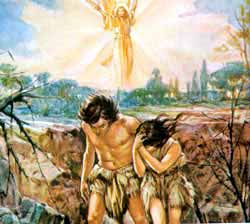 Pop quiz: What’s the first death in the Bible?
Pop quiz: What’s the first death in the Bible?
(Yes, I know that’s a grim opener and probably not all that conducive to blogging success. Sorry.)
The gut answer to that question is Abel getting killed by Cain. It’s the first murder, the primal, iconic act of violence. But it’s not the first death.
Let’s go back a bit. Adam and Eve eat the forbidden fruit and immediately guilt, shame and sin enter their lives. The immediate symptom of this is that they’re embarassed by their nakedness and they try to cover themselves up with fig leaves. They also try to hide from God.
Anyway, they get banished from Eden, but leaves aren’t going to provide the best protection against the new, hostile environment they find themselves in. And so God makes them clothes out of animal skins.
And, of course, to do that, an animal has to die. Death enters the world, but, crucially, the death of an animal saves the life of humans.
This is a theme that’s fundamental throughout the Bible – the sacrificial system, for instance, or a ram being sacrificed instead of Isaac, or the sacrifice of lambs during the first Passover. People are saved, spiritually or physically, but an animal dies in their place.
But this was only ever a temporary solution – eventually the clothes worn by Adam and Eve would have worn out and new ones have to be made. A sort of cycle begins here that, symbolically at least, gets echoed in the great festivals of the Hebrew people and their associated sacrifices. The whole thing’s embedded in the calendar. Every year the festivals and sacrifices would have to take place once again.
Now, the Christ-as-Sacrifice idea isn’t the only explanation of how the Cross ‘works’, but in the light of all this it’s a compelling one. And yet this sacrifice was permanent. This time the substitute wasn’t an animal, it was the Son of God.
Actually, saying it that way doesn ‘t always help – it makes it sound like a father demanding the execution of his son, which repels us. But, if we accept that Christ was – is – divine and, in his very nature a part of the Trinity, then this becomes an act of cosmic self-sacrifice – God, in some form at least, sacrificing himself for humanity. God is the hero of the story.
This stuff is difficult to get our heads around – animal rights isn’t a fringe belief anymore, and violence isn’t really cool. Nevertheless, it’s there throughout the scriptures, from here in Genesis 3 to the Book of Revelation. It’s biblical DNA.
And so we have to decide what to do with that, or at least what to do with the sacrifice that has permanent, continual relevance. It’s a key question for Easter, when we specifically remember this through the medium of chocolate eggs, but really it’s a question of ongoing importance.
What do we do with Jesus?

Pingback: Look To The East: What do directions mean in the Bible? | The Left Hand of Ehud: Matt's Bible Blog